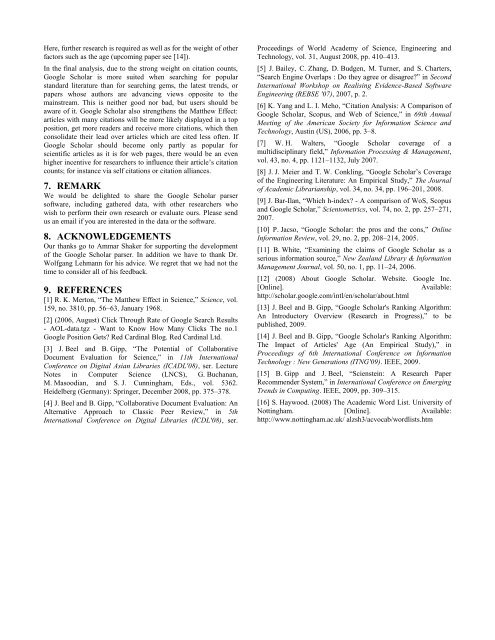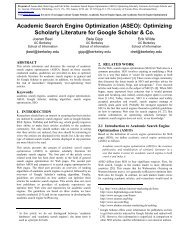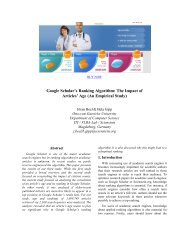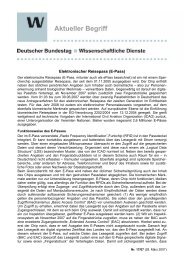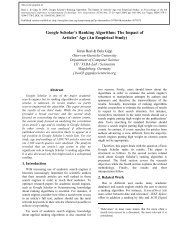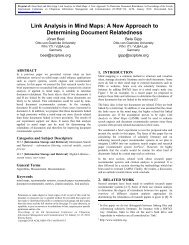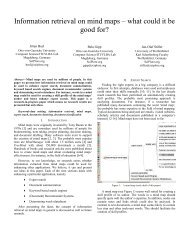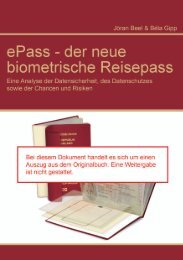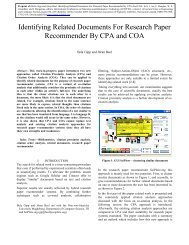Google Scholar's Ranking Algorithm: The Impact of ... - Bela Gipp
Google Scholar's Ranking Algorithm: The Impact of ... - Bela Gipp
Google Scholar's Ranking Algorithm: The Impact of ... - Bela Gipp
Create successful ePaper yourself
Turn your PDF publications into a flip-book with our unique Google optimized e-Paper software.
Here, further research is required as well as for the weight <strong>of</strong> otherfactors such as the age (upcoming paper see [14]).In the final analysis, due to the strong weight on citation counts,<strong>Google</strong> Scholar is more suited when searching for popularstandard literature than for searching gems, the latest trends, orpapers whose authors are advancing views opposite to themainstream. This is neither good nor bad, but users should beaware <strong>of</strong> it. <strong>Google</strong> Scholar also strengthens the Matthew Effect:articles with many citations will be more likely displayed in a topposition, get more readers and receive more citations, which thenconsolidate their lead over articles which are cited less <strong>of</strong>ten. If<strong>Google</strong> Scholar should become only partly as popular forscientific articles as it is for web pages, there would be an evenhigher incentive for researchers to influence their article‟s citationcounts; for instance via self citations or citation alliances.7. REMARKWe would be delighted to share the <strong>Google</strong> Scholar parsers<strong>of</strong>tware, including gathered data, with other researchers whowish to perform their own research or evaluate ours. Please sendus an email if you are interested in the data or the s<strong>of</strong>tware.8. ACKNOWLEDGEMENTSOur thanks go to Ammar Shaker for supporting the development<strong>of</strong> the <strong>Google</strong> Scholar parser. In addition we have to thank Dr.Wolfgang Lehmann for his advice. We regret that we had not thetime to consider all <strong>of</strong> his feedback.9. REFERENCES[1] R. K. Merton, “<strong>The</strong> Matthew Effect in Science,” Science, vol.159, no. 3810, pp. 56–63, January 1968.[2] (2006, August) Click Through Rate <strong>of</strong> <strong>Google</strong> Search Results- AOL-data.tgz - Want to Know How Many Clicks <strong>The</strong> no.1<strong>Google</strong> Position Gets? Red Cardinal Blog. Red Cardinal Ltd.[3] J. Beel and B. <strong>Gipp</strong>, “<strong>The</strong> Potential <strong>of</strong> CollaborativeDocument Evaluation for Science,” in 11th InternationalConference on Digital Asian Libraries (ICADL'08), ser. LectureNotes in Computer Science (LNCS), G. Buchanan,M. Masoodian, and S. J. Cunningham, Eds., vol. 5362.Heidelberg (Germany): Springer, December 2008, pp. 375–378.[4] J. Beel and B. <strong>Gipp</strong>, “Collaborative Document Evaluation: AnAlternative Approach to Classic Peer Review,” in 5thInternational Conference on Digital Libraries (ICDL'08), ser.Proceedings <strong>of</strong> World Academy <strong>of</strong> Science, Engineering andTechnology, vol. 31, August 2008, pp. 410–413.[5] J. Bailey, C. Zhang, D. Budgen, M. Turner, and S. Charters,“Search Engine Overlaps : Do they agree or disagree?” in SecondInternational Workshop on Realising Evidence-Based S<strong>of</strong>twareEngineering (REBSE '07), 2007, p. 2.[6] K. Yang and L. I. Meho, “Citation Analysis: A Comparison <strong>of</strong><strong>Google</strong> Scholar, Scopus, and Web <strong>of</strong> Science,” in 69th AnnualMeeting <strong>of</strong> the American Society for Information Science andTechnology, Austin (US), 2006, pp. 3–8.[7] W. H. Walters, “<strong>Google</strong> Scholar coverage <strong>of</strong> amultidisciplinary field,” Information Processing & Management,vol. 43, no. 4, pp. 1121–1132, July 2007.[8] J. J. Meier and T. W. Conkling, “<strong>Google</strong> Scholar‟s Coverage<strong>of</strong> the Engineering Literature: An Empirical Study,” <strong>The</strong> Journal<strong>of</strong> Academic Librarianship, vol. 34, no. 34, pp. 196–201, 2008.[9] J. Bar-Ilan, “Which h-index? - A comparison <strong>of</strong> WoS, Scopusand <strong>Google</strong> Scholar,” Scientometrics, vol. 74, no. 2, pp. 257–271,2007.[10] P. Jacso, “<strong>Google</strong> Scholar: the pros and the cons,” OnlineInformation Review, vol. 29, no. 2, pp. 208–214, 2005.[11] B. White, “Examining the claims <strong>of</strong> <strong>Google</strong> Scholar as aserious information source,” New Zealand Library & InformationManagement Journal, vol. 50, no. 1, pp. 11–24, 2006.[12] (2008) About <strong>Google</strong> Scholar. Website. <strong>Google</strong> Inc.[Online].Available:http://scholar.google.com/intl/en/scholar/about.html[13] J. Beel and B. <strong>Gipp</strong>, “<strong>Google</strong> <strong>Scholar's</strong> <strong>Ranking</strong> <strong>Algorithm</strong>:An Introductory Overview (Research in Progress),” to bepublished, 2009.[14] J. Beel and B. <strong>Gipp</strong>, “<strong>Google</strong> <strong>Scholar's</strong> <strong>Ranking</strong> <strong>Algorithm</strong>:<strong>The</strong> <strong>Impact</strong> <strong>of</strong> Articles' Age (An Empirical Study),” inProceedings <strong>of</strong> 6th International Conference on InformationTechnology : New Generations (ITNG'09). IEEE, 2009.[15] B. <strong>Gipp</strong> and J. Beel, “Scienstein: A Research PaperRecommender System,” in International Conference on EmergingTrends in Computing. IEEE, 2009, pp. 309–315.[16] S. Haywood. (2008) <strong>The</strong> Academic Word List. University <strong>of</strong>Nottingham. [Online]. Available:http://www.nottingham.ac.uk/ alzsh3/acvocab/wordlists.htm


